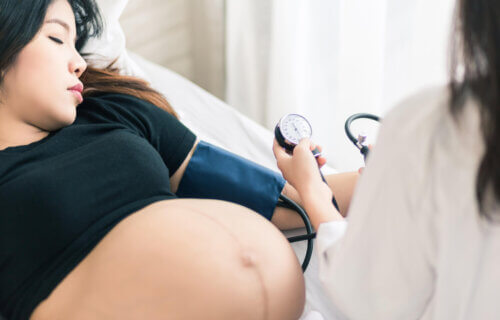SEATTLE — A COVID-19 infection during pregnancy, even a mild one, can potentially damage the placenta’s immune response to further infections, according to researchers from the University of Washington School of Medicine.
“This is the largest study to date of placentas from women who had COVID-19 during their pregnancies,” says senior study author Dr. Kristina Adams Waldorf, a professor of obstetrics and gynecology, in a university release. “We were surprised to find that women who had COVID-19 during their pregnancies had placentas with an impaired immune response to new infection.”
Dr. Adams Waldorf adds that these findings are just “the tip of the iceberg” regarding how COVID-19 may influence fetal or placental development. When COVID-19 first appeared, most scientists theorized that the coronavirus did not harm developing fetuses due to so few babies being born with an active COVID-19 infection.
“But what we’re seeing now is that the placenta is vulnerable to COVID-19, and the infection changes the way the placenta works, and that in turn is likely to impact the development of the fetus,” Dr. Adams Waldorf explains.
“To date, the studies about how COVID-19 might affect fetal or child development are very limited as the children are still very young,” adds study co-author Dr. Helen Feltovich, professor and associate medical director for maternal fetal medicine imaging at Intermountain Healthcare in Utah. “Our study suggests that babies born to mothers infected with COVID-19 at any point during their pregnancy will need to be monitored as they grow up.”
Growing evidence that COVID disrupts pregnancy
As a fetus develops in the mother’s womb, the placenta provides nourishment, oxygen, and immune protection until it’s time for birth. Earlier studies led by Dr. Adams Waldorf found that women who contract COVID exhibit a notably higher mortality rate in comparison to other females who did not contract the virus. Meanwhile, according to the Center for Disease Control and Prevention, other studies report pregnant women are more likely to need hospitalization or experience preterm birth.
Right now, study authors admit it is unclear how different COVID variants may influence both mother and child.
“Studying each of the variants in real time is really challenging,” Dr. Adams Waldorf says, “because they just keep coming so fast, we can’t keep up. We do know that the COVID-19 Delta variant was worse for pregnant individuals, because there was a spike in stillbirths, maternal deaths and hospitalizations at that time.”
Regardless of the specific COVID-19 variant, Dr. Adams Waldorf stresses that women should do everything they can to avoid COVID infection. Study authors recommend pregnant women get vaccinated and boosted, continue wearing a mask in public, and only socialize with other vaccinated individuals. Obviously, that can be tough advice to stick to in real life, but Dr. Adams Waldorf says some isolation is worth it to avoid the coronavirus while pregnant.
“The disease may be mild, or it may be severe, but we’re still seeing these abnormal effects on the placenta,” the researcher concludes. “It seems that after contracting COVID-19 in pregnancy, the placenta is exhausted by the infection, and can’t recover its immune function.”
COVID tripled risk of premature birth
These findings are based on an analysis of 164 pregnant women; 24 uninfected healthy patients served as a control group while 140 individuals who contracted COVID-19 were also included. Both groups gave birth at about the same time (37-38 weeks). Among patients with COVID-19, preterm birth occurred at an almost three times higher rate in comparison to the control group. Roughly 75 percent of the COVID group either had no or mild symptoms.
Placental tissues were collected by medical providers at the time of delivery with patient approval via either the Intermountain Healthcare Research Institutional Review Board, in Salt Lake City, Utah, or the University of Washington Human Subjects Division.
The study is published in the American Journal of Obstetrics and Gynecology.


The “largest study to date” of a whopping 146 people, and that’s somehow “the tip of the iceberg” instead of something that deserves a lot more research before a real scientist would ever make a definitive statement about it. Don’t forget to pour on a heaping helping of “suggests,” “coulds,” “mights,” “likelies” and “tired placentas” while you’re at it, science people. One hundred forty individuals “contracted covid” and over half had no symptoms? That’s called being healthy. Prove that they “had covid” with viral cultures from each of them. I dare you. Then your study will have a basis in something real. Until you culture you have zero idea what virus, if any, those women allegedly had. This breathless announcement is just attention-seeking behavior using always-discredited “tests” for a cold virus that are *never* confirmed with cultures because the cultures would prove the fraud.
Oh, and don’t look now, scientists, but your agenda is showing: “Our study suggests” (there are those words again) “that babies born to mothers infected with covid-19 at any point in their pregnancy will need to be monitored as they grow up.” Track and trace those little suckers from birth. Get ’em used to it early. Monitored for what? Why? Has anyone ever “monitored” kids at all, much less *throughout childhood* because the mother caught a cold while pregnant? Has it crossed anyone’s mind that 2.5 years of cancelling doctors’ appointments, concentrating and inhaling CO2, and rebreathing what the immune system’s trying to expel with every breath might account for the pathologies allegedly observed? Or that the injections themselves did? What was the “vax” status of those women? What was the breakdown of the study participants by race and socio-economic status? Those are known predictors of fetal and maternal health. No answers here, and I’m guessing no answers from the “researchers,” either. But by all means: Urge pregnant women to keep up the exact same behaviors that have already been disproven as virus blockers: repeated negative efficacy injections, muzzles, and ostracizing your free-thinking neighbors.